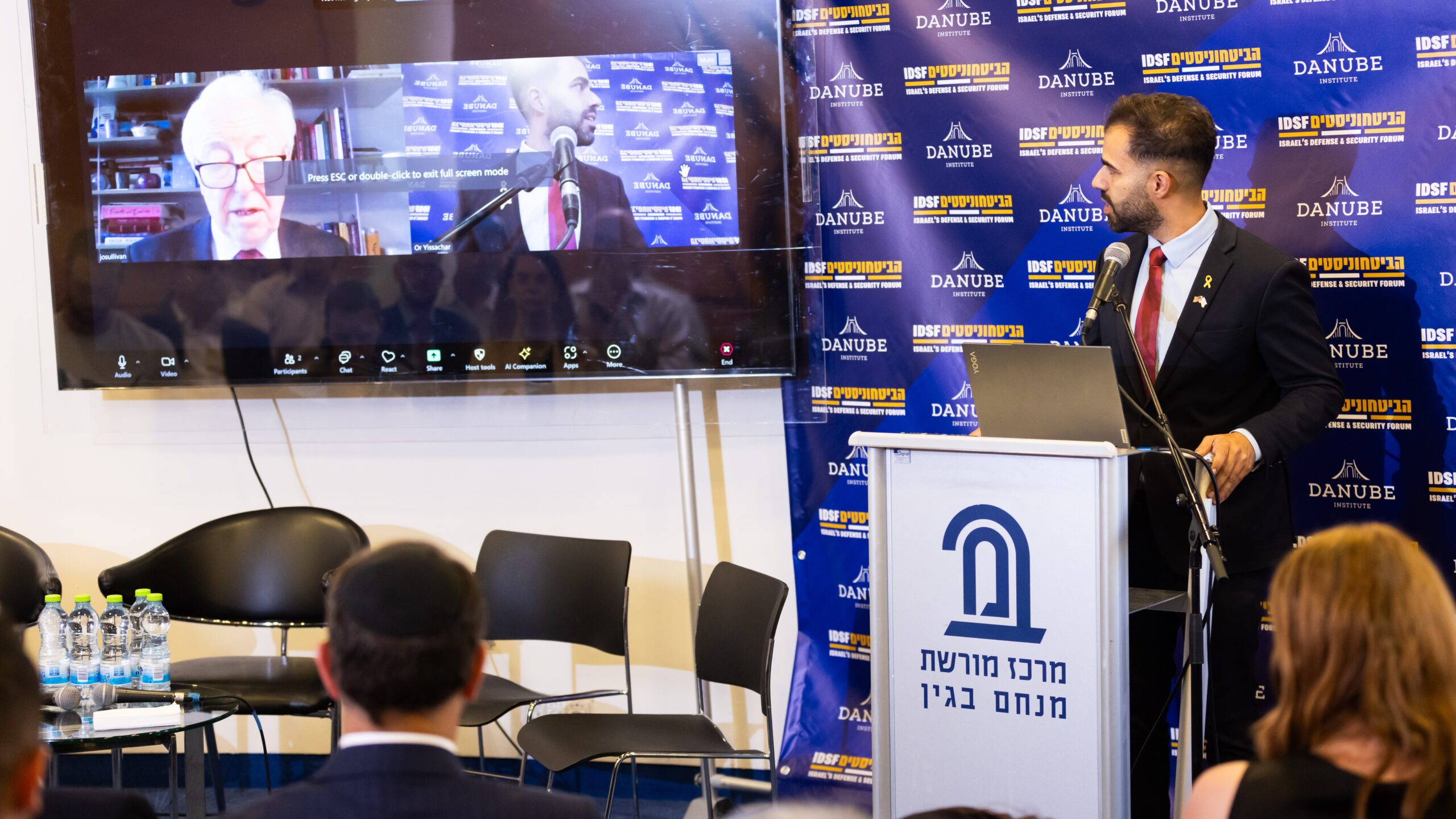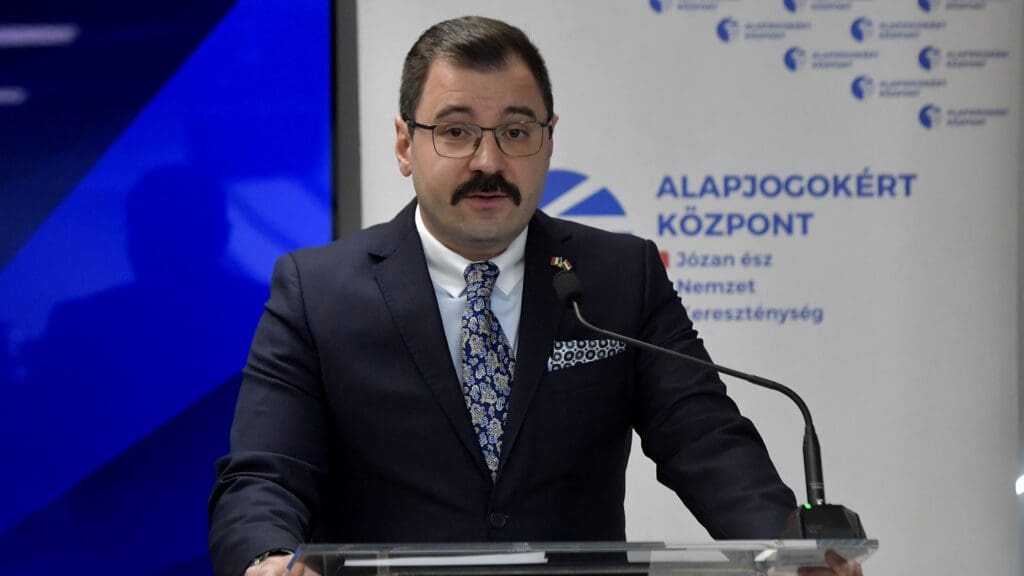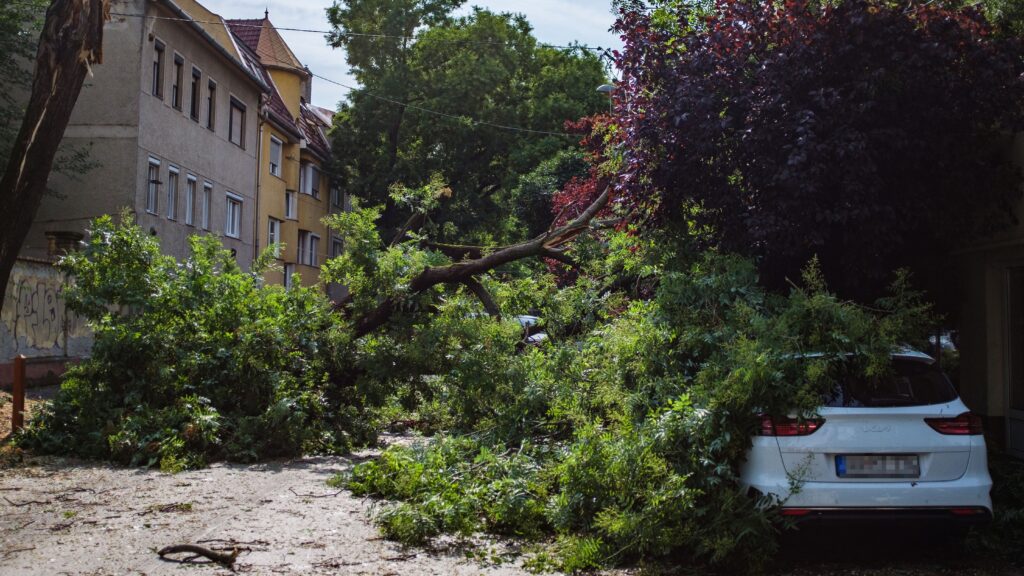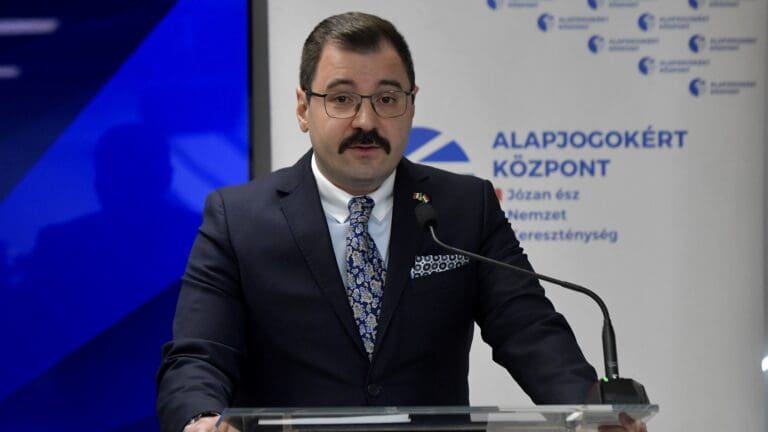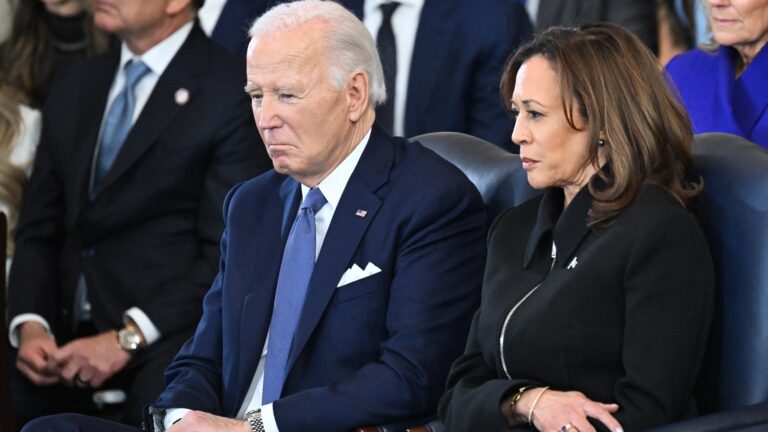Hamas’s brutal attack on 7 October was the worst assault since the Holocaust against the Jewish people, which changed Israel forever and shocked the Middle East and the world. Approaching the one-year anniversary of the massacre, the Israel Defence and Security Forum (IDSF) and the Danube Institute organized a conference titled October Effect: Strategic Implications for Israel and Europe in the Middle East War on 9 September at the Menachem Begin Heritage Center in Jerusalem. The gathering aimed to address the rise of antisemitism in the West, the ramifications of Israel’s war in Gaza, and the deepening Russia –China–Iran axis.
The Tidal Wave of Antisemitism Engulfing the West
The conference started with welcoming remarks by Danube Institute President John O’Sullivan, followed by the first panel titled ‘The tidal Wave of Antisemitism Engulfing the West’, moderated by Jamie Geller. He posed his first question to Fleur Hassan Nahoum, Israeli Special Envoy for Trade and Innovation and outgoing Deputy Mayor of Jerusalem, about whether she sees an equation between antisemitism and anti-Zionism after 7 October. Mr Gelker also asked how 7 October has affected the relationship of European heads of state with the state of Israel. In her answer the expert noted that anti-Zionism was always antisemitism; it was just a ‘politically correct’ way to hate Jewish people and Israel, she suggested. Hassan Nahoum explained that in Europe, even before 7 October, antisemitism was brewing under the surface, and it took two days for it in many Western countries like the UK and Spain to reach the surface and turn target Israel and the Jewish people.

To the question of what the situation is regarding the level of antisemitism in Belgium, New Flemish Alliance MP in the Belgium Chamber of Representatives and former editor of the Jewish Currents magazine Michael Freilich painted a worrying picture. He highlighted that Western European Jewry is in grave danger, which he feels personally, as in Belgium, antisemitic people have proudly written antisemitic messages to him and to other Jewish figures, the Jewish people for all evil. Therefore, MP Freilich highlighted, a change needs to be made in the education system; it is the source of antisemitism that has to be found, and actions, including calling out the bias of the mainstream media, have to be made to counter the worrying level of antisemitism.
To illustrate how Hungary has learnt from its history and is now a safe haven for Jewish people, historian and author László Bernát Veszprémy, editor-in-chief of Corvinák, highlighted that unlike the European countries mentioned earlier, Hungary protects its Jewish citizens by banning pro-Hamas demonstrations and defending Israel in the European Union’s Parliament and in the United Nations against anti-Israeli statements.
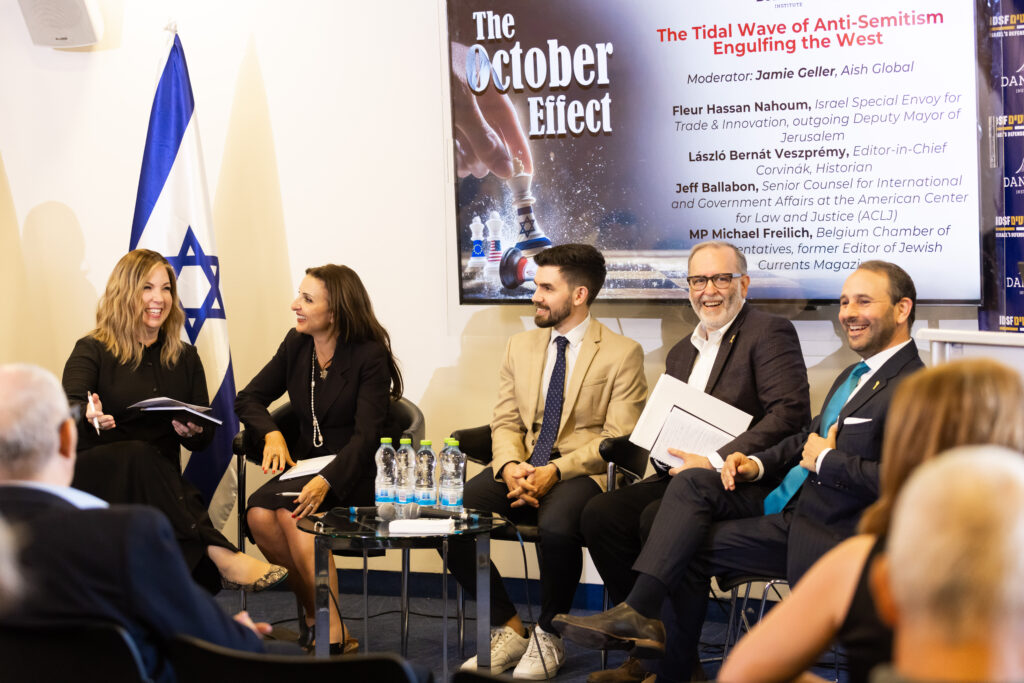
Jeff Ballabon, a Senior Counsel for International and Government Affairs at the American Center for Law and Justice underscored how the narrative on Israel in the US shifted since the presidency of Jimmy Carter. While Carter opposed an independent Palestinian state arguing it would be a destabilizing factor in the Middle East and not serve US’s interests, Bill Clinton was in favour of an independent Palestinian state.
A War on Two Fronts? The Day After in Gaza and the Hezbollah Menace
Director of Research at the IDSF, Brig. Gen. (Res.) Yossi Kuperwasser stressed that the IDSF not only knew about the possibility of a threat from Hamas before 7 October but sounded the alarm with a National Security Assessment written in 2022. In the assessment, they used an analogy of likening the State of Israel to the frog in the cauldron, swimming while the water is imperceptibly heating up and cooking the frog slowly. General Kuperwasser explained that the events of 7 October alerted the frog, referring to a Brig. Gen. (Res.) Amir Avivi op-ed that highlighted: Israel ‘must not allow the frog to jump back in the cauldron. We have got to mend our ways and leverage this threat in order to emerge victorious against our enemies and guarantee the State of Israel’s security for generations to come.’ The IDSF shared the alarming national security assessment with military and political leaders, who, he said, ignored the threat. The general concluded by warning the West that it should learn from this lesson and follow Israel in avoiding a wide-scale war with Iran.
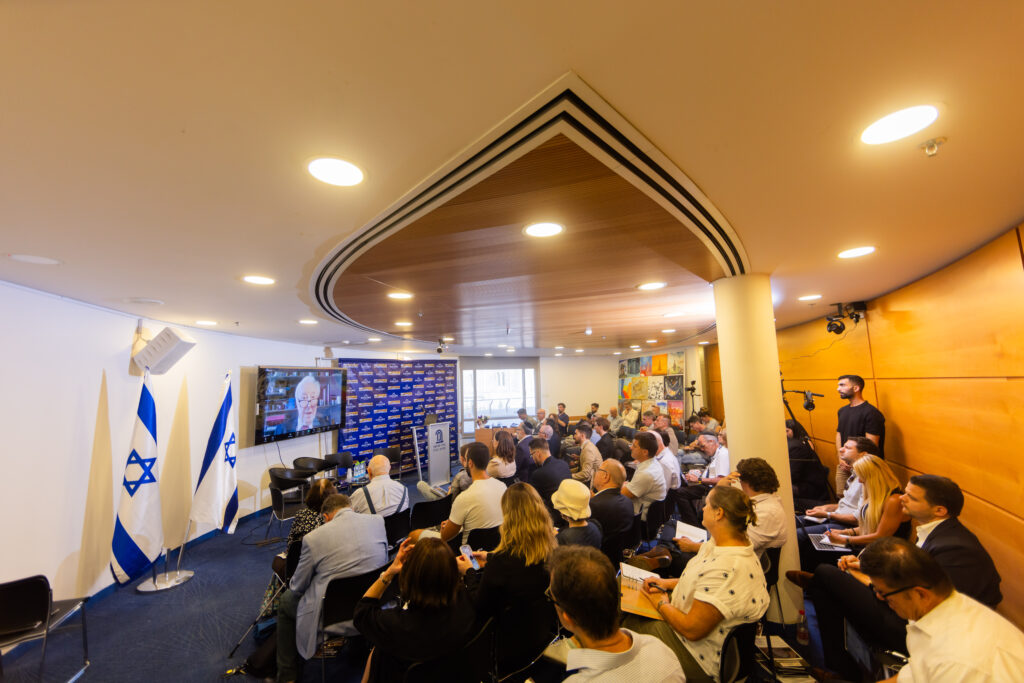
Following Brig. Gen. (Res) Kuperwasser’ keynote address, Major General (Res.) Gershon Hacohen explained that Israel’s first prime minister, David Ben Gurion, had a vision of successfully leading Israel with a doctrine with three cornerstones: building a small ordinary army with a massive base of reservists, which, in case of conflict, have to be alerted in time; Israel must achieve a decisive victory in order to get deterrence so Israel can get a decade of prosperity; making sure that war is only going on for short periods of time. General Hacohen explained that the enemy and warfare have changed over time. Israel’s enemies, including Hamas, have several times resorted to surprise attacks so that Israel would not have time to prepare. Also, Hamas’s terror tunnels were also meant to ensure that Israel could not achieve decisive victory in a short amount of time.
Yifa Segal, the former Chief of Staff to the Israeli Ambassador to the US and Managing Director of Hetz for Israel, spoke about the plan they devised for the day after in Gaza. The plan includes, first and foremost, not repeating the mistake of allowing a threat of Islamic Jihad on Israel’s border. As Segal phrased, Gaza was guided by the hatred of Israel and the desire to make sure that, preferably with violence, Israel comes to an end. The ‘Day After Gaza’ plan includes four fundamental principles: first, Israel must have full security control over the Gaza Strip; second, the indoctrination of children in education to hate and kill Jews must be stopped, just as Nazi Germany had to be de-Nazified after the Second World War; third, governance of the Gaza Strip must be decentralized and several local authorities need to be in charge; and fourth, to condition international aid to avoid that it’s used for terror purposes.
The last speaker on the second panel was Lieutenant Colonel (Res.) Sarit Zehavi, the Chair of the ALMA Center for the Research of the North. She started by highlighting her personal experience as a mother who lives nine kilometres from the border and who had to live through the frightening moment when her daughter, who was at home alone, had to run to the shelter as rockets were launched into the area around her home. She stressed that living like that, amidst a continuous threat, cannot continue. Lieutenant Colonel Zehavi reminded that there are 60,000 Israelis who are not evacuees but displaced in their own country as a result of the threat posed by Hezbollah.
Tony Abbott on the ‘Utter Barbarity’ of 7 October
In his video message to the conference that Hon. Tony Abbott, Former Prime Minister of Australia and Visiting Fellow at the Danube Institute, underscored the importance of supporting Israel and described the 7 October atrocity as of ‘simply unspeakable, utter barbarity.’ Tony Abbot suggested that the conflict in a wider global context is part of the emergence of dictatorships trying to rewrite the world order. He highlighted that the Islamic dictatorship in Tehran uses its proxies to wipe out the Jewish state, ‘create a new Holocaust’ and establish the Shia-Iranian dominance of the Middle East.
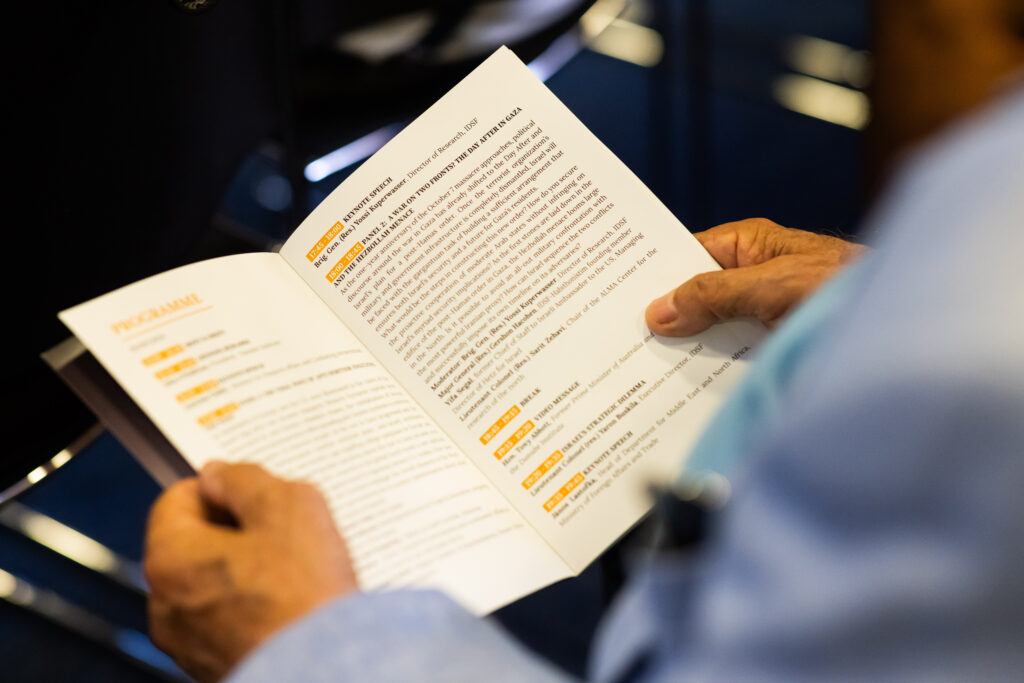
Following the video message Lieutenant Colonel (Res.) Yaron Buskila delivered his keynote speech, posing the two questions everyone has been asking: ‘How it’s possible that despite all of the signs, Shin Bet, IDF, and Israeli authorities didn’t notice the threat and Hamas managed to surprise the State of Israel?’ and ‘How did the IDSF know about everything that would happen and was not listened to?’ He explained that in the 2008 financial crisis, many businessmen were aware of all the signs beforehand, and yet didn’t manage to stop the crisis; the same was true for many Israelis: they noticed the signs but ignored them as their vision was blurred by their misconceptions that did not match the reality that surprised everyone. Firstly, the Hamas agenda to destroy and kill all Israelis from the river to the sea was downplayed. The second misconception, as he phrased it, was that Israel thought that Hamas had a social responsibility towards Gazans; therefore, they would never realize their plan to try to destroy Israel. The third misconception, Lieutenant Colonel Buskila explained, was that if Israel gave money and work opportunities to the Gazans, they would abandon their terrorist aims. In fact, he reminded, just two days before 7 October there were more than 20,000 Gazans working in Israel.
János Lastofka, Head of the Department for Middle East and North Africa at the Ministry of Foreign Affairs and Trade recalled that on 7 October, as he was enjoying an autumn break with his friends, he got the horrific news of Hamas’s invasion of Israel. Although his friends told him they were relieved that he was no longer in Israel, as he recently finished a five-year stint at Hungary’s embassy in Tel Aviv, he would have preferred to be there, ‘to huddle in the shelter with my neighbours, ensure the safety of our staff and citizens, and show solidarity.’ In his speech Lastofka highlighted that declaring or imposing Palestinian statehood now would lead to ‘two states and no solution.’
MEP Tomáš Zdechovský, a member of the European People’s Party EP group, remarked in his presentation that since he’s pro-Israel, he’s been banned from voting and negotiating on many resolutions that concern Israel. Mr Zdechovský highlighted that as a soldier and reservist, he’s responsible for the cyber security of the Czech Republic. He reminded that the around thirty thousand cyber-attacks of Iran on Israel’s infrastructure are at just as worrying as the massive number of rocket attacks.
The Emergence of the Russia–China–Iran Axis
The ironclad unity of the West in supporting Israel after the October massacre was short-lived. As the IDF continued its war in Gaza, growing fissures and fractures emerged in the US, deepened by the Iranian disinformation machine. As the Biden administration’s resolve waned and calls for a ceasefire increased, a new axis composed of Iran, Russia and China depeened. The emergence of this axis was the subject of the discussion in the final panel of the event, titled October’s Global Quakes: The Emergent Russia-China-Iran Axis.
Moderator Kristóf Veres, the international director of the Danube Institute, asked the panellists to mention specific common denominators that bring Iran, China and Russia together. Robert C. Castel, the well-known Hungarian Israeli expert on security policy, a high-ranking Israeli civilian security officer, named the crucial characteristic as demographic decline, which brings together these countries as ‘impatient powers’. However, Castel added an analogy, too: in his view, this axis is like a car with wheels of different sizes that can’t go too far. Or Yissachar, the Vice President of Research and Content at the IDSF, explained that it is important to reframe the conflict and define it, rather than the Israel–Hamas war, as the ‘new Cold War between the West and the Rest’. Monika Palotai, Senior research fellow at the Religious Freedom Institute, highlighted that even though Iran is fighting against it, the evolving axis wouldn’t exist without the United States as a common adversary. Ms Palotai reminded that Ukraine and Israel are in fact fighting against the same axis.
All photos in this article are courtesy of the conference organizers.

